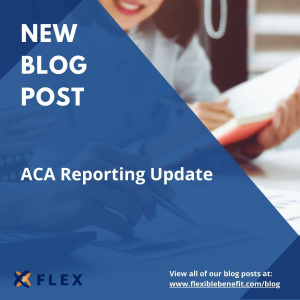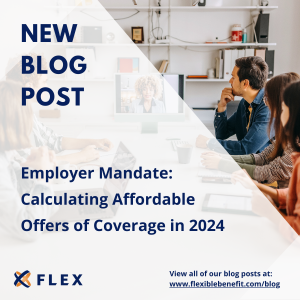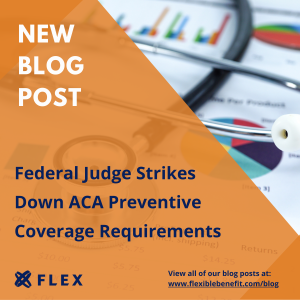ACA
The reporting requirements of the Affordable Care Act (ACA) are quickly approaching. Employers subject to the Employer Mandate should prepare to submit Forms 1094-C/1095-C to the Internal Revenue Service (IRS) by April 1, 2024. Employers not subject to the Employer Mandate but who offer a self-funded plan, including level funded plans and Individual Coverage Health Reimbursement Arrangements (ICHRAs) should be prepared to submit Forms 1094-B/1095-B to the IRS by this same date.
The Employer Mandate guidelines state that coverage is affordable when an employee must pay no more than 9.5% of their household income (inflation-adjusted to 8.39% for the 2024 plan year) for self-only coverage which is offered, but which employers know the household income of an employee?
The Internal Revenue Service (IRS) recently issued Rev. Proc. 2023-29 which includes information about the changes to the affordability percentage as it relates to the Employer Mandate for 2024.
On March 30, 3023, U.S. District Judge Reed O’Connor issued a ruling that health insurance plans are not required to cover many preventive services, nor are the plans required to cover many preventive services cost-free to members. Preventive service coverage requirements have been required as a provision of the Affordable Care Act (ACA) since 2010.
The Affordable Care Act (ACA) created a research institute known as the Patient-Centered Outcomes Research Institute (PCORI). The goal of PCORI is to help patients and those who care for them make better-informed decisions about healthcare choices. PCORI is funded in part by fees which are charged to health plans.
The penalty for failing to comply with Cafeteria Plan rules identified in Internal Revenue Code Section 125 can be severe. The penalties can include the application of income taxes against participants who otherwise thought they were electing non-taxable benefits, the application of employment taxes against participants and the employer, and penalties for failing to withhold and report taxes appropriately, among other things.
Many types of telemedicine coverage eliminate the ability for a person enrolled in a qualified high deductible health plan (HDHP) to make contributions to a Health Savings Account (HSA).
Non-grandfathered health plans (i.e., health plans issued on or after March 23, 2010) are required to cover innetwork preventive services at 100% with no cost-sharing to a member. This is a requirement that was imposed by the Affordable Care Act (ACA). The preventive services that must be covered are specified by the Health Resources and Services Administration (HRSA), the United States Preventive Services Task Force (USPSTF), and the Centers for Disease Control and Prevention (CDC).
On June 28, 2021, the Department of Health and Human Services (HHS) proposed new rules that would primarily impact individual health plans that are sold through Health Insurance Marketplaces. The proposed rules aim to lengthen the annual enrollment period, expand Navigator duties, and minimize any burden or confusion for consumers. A summary of some of the key provisions has been outlined below:
Earlier this morning, the U.S. Supreme Court dismissed a case challenging the constitutionality of the Affordable Care Act (ACA), often referred to as Obamacare. The entire ACA continues to remain as the law of the land.










